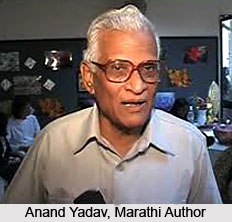 The Sahitya Akademi Awards was first established in the year 1954, under the gargantuan canopy of the Sahitya Akademi itself, the Indian National Academy of Letters. Sahitya Akademi is that supremely prestigious organisation, funding by itself and awarding and honouring every year the most outstanding and extraordinaire persona and his/her priceless contribution to the Indian literary genres. Be it in any of the 24 officially recognised languages that an authors pens, Sahitya Akademi Awards is legendary for its unbiased ness towards every regional language in India, also including tribal ones. Likewise, Sahitya Akademi Award also has created its mark on Marathi literature, honouring every year, since its commencement. Sahitya Akademi Award in Marathi, however was not honoured in the year 1957, outside which every year has remained witness to celebrated personalities and their literary works.
The Sahitya Akademi Awards was first established in the year 1954, under the gargantuan canopy of the Sahitya Akademi itself, the Indian National Academy of Letters. Sahitya Akademi is that supremely prestigious organisation, funding by itself and awarding and honouring every year the most outstanding and extraordinaire persona and his/her priceless contribution to the Indian literary genres. Be it in any of the 24 officially recognised languages that an authors pens, Sahitya Akademi Awards is legendary for its unbiased ness towards every regional language in India, also including tribal ones. Likewise, Sahitya Akademi Award also has created its mark on Marathi literature, honouring every year, since its commencement. Sahitya Akademi Award in Marathi, however was not honoured in the year 1957, outside which every year has remained witness to celebrated personalities and their literary works.
The following may be mentioned:
Year
Book
Author
2008
Utsukatene Mee Zopalo
Shyam Manohar
2007
Bhoomi
Asha Bage
2006
Bhoomi (Novel)
Aasha Bage
2005
Bhijaki Vahi
Arun Kolatkar
2004
Baromas
Sadanand Deshmukh
2003
Dangora Eka Nagaricha
T.V.Sardeshmukh
2002
Yugant
Mahesh Elkunchwar
2001
Tanakat
Rajan Gavas
2000
Panzad
N.D.Mahanor
1999
Tamrapat
Ranganath Pathare
1998
Tukaram Darshan
Sadanand More
1997
Dnyaneshwaritil Laukik Srushti
M.V.Dhond
1996
Eka Mungiche Mahabharat
Gangadhar Gadgil
1995
Raghava vel
Namdeo Kamble
1994
Ekun Kavita1
Dilip Chitre
1993
Mardhekaranchi Kavita
Vijaya Rajadhyksha
1992
Zada Zadati
Vishwas Patil
1991
Teeka Svayanwar
Bhalchandra Nemade
1990
Zombi
Anand Yadav
1989
Haravlele Diwas
Prabhakar Urdhwareshe
1988
Uchalya
Laxman Gaikwad
1987
Shri Vitthal : Ek Mahasamanvay
R. C. Dhere
1986
khoon Gathi
N.G.Deshpande
1985
Ek Zad ani Don Pakshi
Vishram Bedekar
1984
Garbhareshmi
Indira Sant
1983
Sattantar
Vyankatesh Madgulkar
1982
Saundaryanubhav
Prabhakar Padhye
1981
Upara
Laxman Mane
1980
Salaam
Mangesh Padgaonkar
1979
Srushti, Saundarya ani Sahityamulya
Sharadchandra Muktibodh
1978
Nakshatranche Dene
C.T. Khanolkar Arati Prabhu
1977
Dashapadi
A.R. Deshpande Anil
1976
Smarangatha
G. N. Dandekar
1975
Soundarya Mimansa
R. B. Patankar
1974
Natasamrat
Vishnu Vaman Shirwadkar
1973
Kajalmaya
G. A. Kulkarni
1972
Jevha Manus Jaga Hoto
Godavari Parulekar
1971
Pais
Durga Bhagwat
1970
Adarsh Bharat Sevak
N. R. Phatak
1969
Natyacharya Deval
S. N. Banhatti
1968
Yugant
Irawati Karve
1967
Bhasha : Itihas ani Bhoogol
N. G. Kelkar
1966
Shri Shiv Chhatrapati
T S Shejwalkar
1965
Vyakti ani Valli (Sketches)
P. L. Deshpande
1964
Swami (Novel)
Ranjit Desai
1963
Rathachakra (Novel)
S. N. Pendse
1962
Anamikachi Chintanika (Philosophical reflections)
P. Y. Deshpande
1961
Dr.Ketkar (A treatise on poetics)
D. N. Gokhale
1960
Yayati (Novel)
Vishnu Sakharam Khandekar
1959
Bharatiya Sahityashastra
G.T. Deshpande
1958
Bahurupee (Autobiography)
Chintamanrao Kolhatkar
1957
(No Award)
(No Award)
1956
Saundarya ani Sahitya (A study of aesthetics)
B. S. Mardhekar
1955
Vaidik Sanskruticha Vikas (Cultural history)
Tarkateertha Laxman Shastri Joshi




















